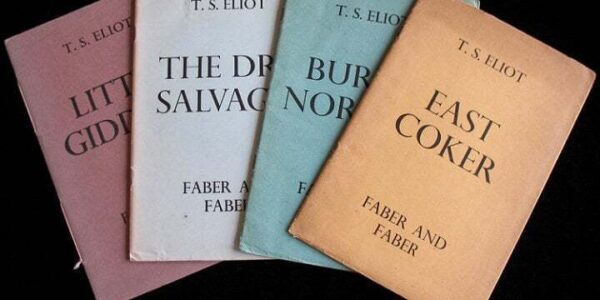Burnt Norton (fragment)
T.S. Eliot

‘At the still point of the turning world.
Neither flesh nor fleshless;
Neither from nor towards;
at the still point, there the dance is,
But neither arrest nor movement.
And do not call it fixity,
Where past and future are gathered.
Neither movement from nor towards,
Neither ascent or decline.
Except for the point, the still point,
There would be no dance, and there is only the dance.’
- T.S. Eliot, “Burnt Norton”
Burnt Norton was the first poem of American poet and playwright T.S. Eliot’s Four Quartets. Published in 1936, its title refers to the manor house Eliot visited with his longtime muse and confidante Emily Hale in the Cotswolds. The poem focuses on reflections on the nature of time, the universe and the divine. Eliot discusses the concept of the present moment as the only one that really matters, as we cannot change the past and we cannot know the future. The poem combines references to the Bhagavad-Gita and the Pre-Socratics as well as St. John of the Cross and Julian of Norwich, thereby blending Eastern and Western religious and cultural traditions. Whilst its concept is tightly connected to Eliot’s 1935 play Murder in the Cathedral, its structure composed in five sections is linked to his 1922 poem The Waste Land. The fragment from which this exhibition derives its title, is included in the second part of Burnt Norton where Eliot zooms in on a special state between time and movement, described as 'the eternal dance'.
1936 - fragment from ‘Burnt Norton’, first of T.S Eliot’s Four Quartets

T.S. Eliot
°1988, St-Louis, US - 1965, London UK
Thomas Stearns Eliot was an American-English poet, playwright, literary critic, and editor, who exercised a strong influence on Anglo-American culture from the 1920s until late in the century. His practice revitalized English poetry, pushing its traditional boundaries on the level of diction, style and versification. Eliot was also noted for his critical essays, which often reevaluated long-held cultural beliefs. The publication of Four Quartets (1943) led to his recognition as the greatest living English poet. In 1948, he was awarded both the Order of Merit and the Nobel Prize for Literature. T.S. Eliot passed away in London in 1965.